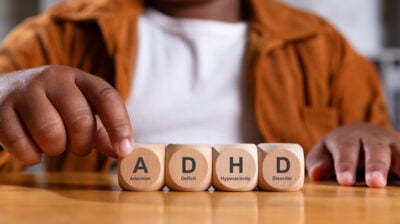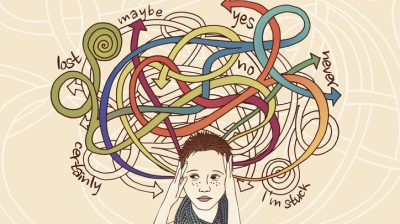What supports can I access after a late ADHD diagnosis?
Find information on your entitlements to financial, workplace and educational supports as a late diagnosed ADHDer.

Attention deficit hyperactivity disorder (ADHD) is a condition that starts in childhood, but not everyone is diagnosed as a child. Some people receive a late ADHD diagnosis as adults. Researchers believe that adults diagnosed with ADHD had the condition as children but were not identified at that time. According to the Diagnostic and Statistical Manual of Mental Disorders, Fifth Edition (DSM-5), a guide used by healthcare professionals to diagnose mental health conditions, ADHD symptoms must have been present before age 12 to receive a clinical diagnosis.
After receiving a late ADHD diagnosis, you might wonder what ADHD is and if it qualifies as a lifelong disability. ADHD is considered a disability when it creates barriers to fully participating in work or social life. Although you may choose not to identify personally as disabled, you might still want to access support or accommodations through the Disability Act 2005.
In this factsheet, you will find information on:
- Why a professional might not have diagnosed your ADHD in childhood
- Whether ADHD is a lifelong condition
- What financial, educational, and work supports you may be able to claim with an ADHD diagnosis
Why was my ADHD missed as a child, leading to a late ADHD diagnosis?
Adults can miss a child’s ADHD for a variety of reasons. Girls and young women tend to be under-diagnosed because they show the ‘predominantly inattentive’ presentation more often than boys. Cultural bias can also mean that professionals miss signs of ADHD in people from ethnic minority backgrounds at a disproportionate rate. Some reasons a person’s ADHD might be missed in childhood include:
- Adults do not immediately recognise a person’s unique presentation of ADHD (For more information on the three main types of ADHD, visit our factsheet on ADHD signs and symptoms)
- The person with ADHD has a milder form of the condition and/or an ability to hide or mask symptoms effectively
- Professionals misdiagnose a person with a condition that has similar symptoms
While some researchers speculate that children may outgrow their ADHD, a significant number continue to experience symptoms into adulthood. A delayed diagnosis can lead to individuals receiving mental health diagnoses that actually stem from the emotional and psychological effects of living with undiagnosed and untreated ADHD.
Was I born with ADHD despite a late ADHD diagnosis?
You may be wondering whether individuals are “born with ADHD.” Research shows that it is possible for parents to pass a predisposition for ADHD through genes to their children. However, genes are not the only factor to consider. Environmental conditions before and after birth also play an important role. For those who develop ADHD, signs of the disorder can appear as early as three years old. For this reason, researchers and clinicians often describe ADHD as a childhood-onset disorder. While ADHD is a condition that people are born with, you can lessen some of the potentially distressing effects with effective treatment.
Is ADHD a lifelong condition?
While evidence suggests that ADHD symptoms can change over time, it’s still unclear how many children experience this change, to what extent the symptoms decrease, and why this happens.
Some studies suggest that 55-70 per cent of children with ADHD may see their symptoms lessen or disappear in adulthood. Of those adults, 25-48 per cent may still experience mild symptoms that don’t qualify for an ADHD diagnosis. However, other studies indicate that 64 per cent of people with reduced symptoms later experienced a return of their symptoms. They showed cycles of lessening and worsening symptoms over time. According to Children and Adults with Attention-Deficit/Hyperactivity Disorder (CHADD), about 80 per cent of children and young people with ADHD continue to have the disorder into adulthood.
Does late ADHD diagnosis mean permanent disability?
In general, having a disability involves experiencing barriers or challenges to fully participating in work or social life. Individuals with a late ADHD diagnosis may have faced many of these barriers in the past without fully understanding why. Whether or not a person who faces these challenges identifies as having a disability is a personal choice. Some people may not identify as disabled in their personal life. However, they may still qualify as having a legal disability for the purpose of getting support to fully participate in school or work, or to receive an income when unable to work. A person with severe ADHD may qualify as having a disability in the following legal documents:
- The Disability Act 2005: If a person’s ADHD causes “substantial impairment,” they may be entitled to Disability Allowance from the state. Substantial impairment occurs when a disabled person is prevented from working full-time or at all. Read The Disability Act, or find out more information on how to apply for Disability Allowance
- The Employment Equality Acts (1998-2015): If a person’s ADHD significantly affects their ability to work, this Act protects their right to receive “reasonable accommodations” from their employer. It also protects them from discrimination or harassment. “Reasonable accommodations” are practical changes an employer makes to allow a disabled person to work on an equal basis with their colleagues. These accommodations can include flexible work schedules, assistive technologies, quiet workspaces, and additional time to complete tasks
For more information on how your employer can support you at work, visit the ADHD Ireland website.
People with severe ADHD may also be eligible for extra support in education.
Primary and secondary education
In general, students who received special education support at primary level are eligible to continue receiving this support at secondary school. The level of support received is based on the student’s individual needs as laid out in a person’s Individual Education Plan (IEP). You can find more information on accessing special educational support in primary and secondary school on the website of ADHD Ireland.
Students with ADHD who are preparing for Junior or Leaving Certificate examinations can apply for Reasonable Accommodations at the Certificate Examinations (RACE) scheme. Under this scheme, students receive “modified” exam papers designed specially to help those with a range of learning difficulties. Changes may involve simplifying diagrams or images and adjusting the size of text. The scheme can also allow for alternative exam settings, such as rest break rooms and additional exam time. More information on the RACE scheme is available on the State Examinations Commission website.
Third-level education
Students with ADHD who are preparing to enter third level education may qualify for the Disability Access Route to Education (DARE) scheme. As of 1 January 2024, DARE is an alternative admissions scheme for school-leavers under the age of 23 whose disabilities have had a negative impact their second level education. Through this scheme, a student with a formal diagnosis of ADHD can apply for reduced points places at third level institutions. They can do this once they are able to provide:
- An up-to-date Evidence of Disability Form completed by an appropriate professional (i.e., a consultant psychiatrist, psychologist, neurologist, or paediatrician)
- An Educational Impact Statement completed by the student’s school, summarising the impact that the student’s ADHD has had on their second level education
To find out more information about the DARE application and what it involves, visit the DARE website. If you are a second level student with ADHD who is interested in going to college, you’ll find helpful tips in ADHD Ireland’s “A Guide for Students with ADHD.”
Feeling overwhelmed and want to talk to someone?
- Get anonymous support 24/7 with our text message support service
- Connect with a trained volunteer who will listen to you, and help you to move forward feeling better
- Whatsapp us now or free-text SPUNOUT to 50808 to begin.
- Find out more about our text message support service
If you are a customer of the 48 or An Post network or cannot get through using the ‘50808’ short code please text HELLO to 086 1800 280 (standard message rates may apply). Some smaller networks do not support short codes like ‘50808’.






